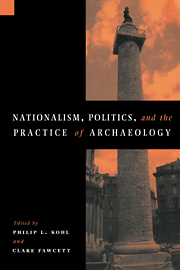Book contents
- Frontmatter
- Contents
- List of maps
- List of contributors
- Acknowledgments
- Part I Introduction
- Part II Western Europe
- 2 Civilization, barbarism, and nationalism in European archaeology
- 3 Archaeology and nationalism in Spain
- 4 Nationalism and Copper Age research in Portugal during the Salazar regime (1932–1974)
- 5 Archaeology in Nazi Germany: the legacy of the Faustian bargain
- 6 Nazi and eco-feminist prehistories: ideology and empiricism in Indo-European archaeology
- Part III Eastern Europe and Eurasia
- Part IV East Asia
- Part V Commentary
- Bibliography
- Index
5 - Archaeology in Nazi Germany: the legacy of the Faustian bargain
Published online by Cambridge University Press: 06 October 2009
- Frontmatter
- Contents
- List of maps
- List of contributors
- Acknowledgments
- Part I Introduction
- Part II Western Europe
- 2 Civilization, barbarism, and nationalism in European archaeology
- 3 Archaeology and nationalism in Spain
- 4 Nationalism and Copper Age research in Portugal during the Salazar regime (1932–1974)
- 5 Archaeology in Nazi Germany: the legacy of the Faustian bargain
- 6 Nazi and eco-feminist prehistories: ideology and empiricism in Indo-European archaeology
- Part III Eastern Europe and Eurasia
- Part IV East Asia
- Part V Commentary
- Bibliography
- Index
Summary
The systematic and institutionalized abuse of archaeology for ideological and political ends during the Third Reich has contributed significantly to developments in post-war German archaeology. The legacy left by the Nazi system has manifested itself as a theoretical void in West German archaeology and the exclusively Marxist perspective of East German archaeology since 1945 (Härke 1989a, 1989b, 1991). German reunification poses urgent questions regarding future developments in German archaeology, both in academia and in state-funded research. It remains to be seen how this future will be determined. The post-World War II histories of these two modern nation-states have been very different politically but very similar with regard to the identity crisis now faced by archaeology as a discipline. The much-needed theoretical debate in German archaeological research, which seems now to be developing actively for the first time since 1945 (Hassmann n.d.), should contribute to a better understanding of the symbiotic relationship between archaeology, politics, and nationalism in other national contexts as well.
Just as Faust struck a bargain with Mephistopheles, German archaeology had a relationship with the Nazis that has continued to affect developments within the discipline. The legacy of the “Faustian bargain” entered into by German archaeologists during the Third Reich has several components, which can be subdivided as follows.
Causes:
The awkward debt, in the form of research institutes, museums, university chairs and funding sources established between 1933 and 1945, owed to the National Socialist regime by the current archaeological establishment.
An historical emphasis in German archaeological research on typological classification, what Jankuhn has called “stamp collecting” (Hӓrke 1991:204).
[…]
- Type
- Chapter
- Information
- Nationalism, Politics and the Practice of Archaeology , pp. 70 - 81Publisher: Cambridge University PressPrint publication year: 1996
- 5
- Cited by



